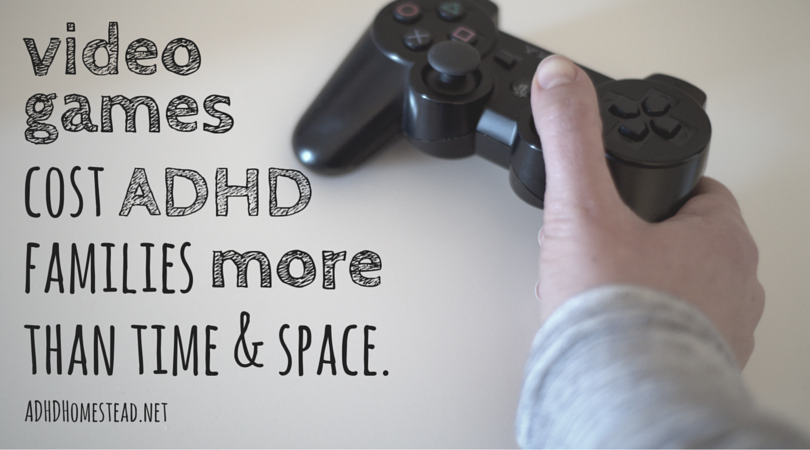Around the turn of the new year, something amazing happened in our house: we got rid of most of our video games. This means less clutter, and I’m excited about the benefits for our family’s energy and willpower.
Mind you, no one really played these games, but my husband wished he could play them. I call this psychic drag, and it’s one reason I love decluttering.
When we hold onto certain kinds of things we don’t use — books, musical instruments, craft supplies, even video games — we don’t just hold onto the thing itself. We hold onto the idea of the thing, and our expectations for how it should be used.

In The Life-Changing Magic of Tidying Up, organizing expert Marie Kondo illustrates how excess stuff hinders self-awareness: “We aren’t sure what would satisfy us or what we are looking for. As a result, we increase the number of unnecessary possessions, burying ourselves both physically and mentally in superfluous things.”
Video games usually harbor less emotional baggage than, say, once-cherished musical instruments or a box of old love letters. That makes them a great place to start. Letting go is a learned skill. As we practice (and start reaping the rewards), we get better. We gain confidence to say goodbye to more things, and figure out what we want to make space (and time and money) for.
As Kondo says, “the best way to find out what we really need is to get rid of what we don’t.”
Leaving our willpower in the bank.
Removing temptation from our home — be it video games or candy — also sets us up for success with other challenges.
That’s because willpower is a finite resource, just like money in the bank. As Stanford University professor Kelly McGonigal writes in The Willpower Instinct, “people who use their willpower tend to run out of it.” Dozens of studies have confirmed this. “Trying to control your temper, stick to a budget, or refuse seconds all tap the same source of strength,” explains McGonigal. “Because every act of willpower depletes willpower, using self-control can lead to losing control.”
Knowing this, I don’t bring cable television or candy into our house. Getting rid of the video games was another big step in the right direction.
Visible, easily-accessible temptations give us a choice. Choosing not to indulge spends a precious resource. I’d rather use that self-control elsewhere: not yelling at my kid, for example.
Everyone can benefit from learning about the science of willpower. I’m especially mindful because people with ADHD start with a lower balance in our willpower bank. We can thank the prefrontal cortex: the part of our brain responsible for “controlling what you pay attention to, what you think about, even how you feel.” In the end, it controls what you do.
This area of the brain — the home of our so-called executive functions — is also where ADHD wreaks its havoc.
The big takeaway for me: more than the average family, it’s critical for us to define our priorities, then systematically remove distractions. Remove the option of channel-surfing or using the television as background noise. Remove the option of playing video games instead of board games with friends. Make sugary snacks unavailable. Strive, as much as possible, for a minimalist lifestyle.
Remove temptation, but also clutter, noise, and distraction. Make choosing the right thing just a little easier.
Science, not edicts.
When it comes to managing our household — setting routines, creating the weekly menu, decorating, deciding which possessions may stay and which must go — I try to back up my decisions with brain science. It’s harder to argue with science than a declaration of “I don’t want you wasting time on video games.”
The video games felt like low-hanging fruit: removing temptations and clutter at the same time? That’s what I call making room for what matters. It’s a simple change with a nice payoff, not to mention extra cash in my pocket after I sell them.
How about you? What have you let go of lately? Is it time to say goodbye to something that siphons off your time, money, or willpower?
Hey there! Are you enjoying The ADHD Homestead?
Here's the thing: I don't like ads. I don't want to sell your attention to an advertising service run by the world's biggest data mining company. I also value my integrity and my readers' trust above all, which means I accept very few sponsorships/partnerships.
So I'm asking for your support directly. For the cost of one cup of coffee, you can help keep this site unbiased and ad-free.
Below you will find two buttons. The first lets you join our crew of Patreon pals and pledge monthly support for my work. Patrons also have access to my Audioblogs podcast. The second takes you to a simple donation page to pledge one-time or recurring support for The ADHD Homestead, no frills, no strings. Do whichever feels best for you!

